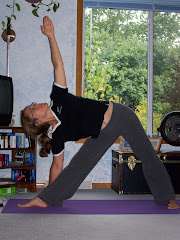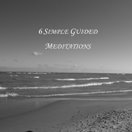
This past weekend I had the honor of attending a workshop with Gary Kraftsow at City Yoga in Indianapolis, Indiana. Gary is the founder of the American Viniyoga Institute with a strong therapeutic approach to Yoga.
"Increasing breath threshold is something that can benefit almost everyone, aside from someone on a respirator," Gary commented. I have to agree with this whole-heartily. Time and again I see people push themselves into down dog even though they have carpel tunnel or take a deep twist with back troubles. (I've been guilty of this last one....)
As wonderful as asana can be, the breath is the doorway to real change and greater health. No doubt about it.
Back to Gary's comment regarding "breath threshold": Breath threshold is the capacity that you have to slow your breath. Another way of putting it is 'to slow your breath without strain is one of the healthiest simplest actions you can take.'
The average person breaths 15 times per minute--that's 15 inhales and 15 exhales in 60 seconds. A healthier person may be down at 8 breaths. A trained yogi may be 4.
The idea is to practice slowing your rate once or twice a day for 10-12 breaths. Then breathe normally throughout the day. Over time your "natural/normal" breath rate will slow down. Right now my breath rate (without controlling or intentionally altering it) is 8/min. Usually it's 6, but I had some dried fruit at breakfast and sugars tend to quicken my rate. You can see how the breath rate is impacted by your environment, diet, thoughts, and actions. Being in a state of fear may cause the breath to be held; this is a natural reaction, but for positive health we're talking about the continuation of inhale and exhale at a slow, deep, and even pace.
Slower breathing means: Lower heart rate, reduced blood pressure, regulation of hormones, calmer mind, improved digestion, and increased immunity.
Swami Jnaneshvara offers an easy method for lengthening the breath while maintain dirgha(steadiness):
"Imagine that you are driving a car, and that you quickly accelerate by firmly pressing the gas pedal with your foot. Imagine that when you want to slow down, you sharply press your foot on the brake pedal. In both cases there is a firm pressure being exerted. Now, imagine that you very gently press the gas pedal to accelerate, and that you very gently press the brake pedal to slow down. You are using less force in both accelerating and decelerating. That backing off, or slowing of the amount of force is what is done with the exertion towards exhalation and inhalation (vichchhedah). Through that slowing process, there is an expansion of awareness of the entire field of prana, which is called pranayama." ~ http://www.swamij.com/yoga-sutras-24953.htm
Thank you, Swamij!



